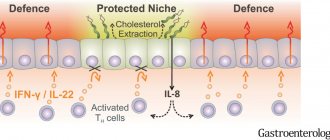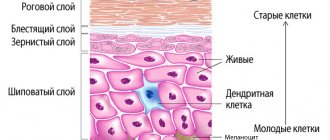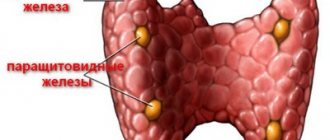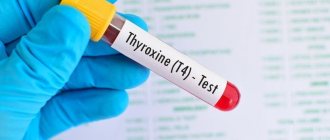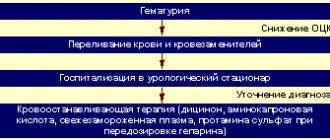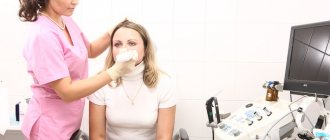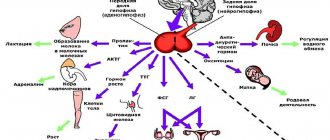Detailed description of the study
Alpha1-antitrypsin (AAT) is a protein whose function is to protect the lungs and prevent the destruction of their alveoli. The formation of AAT is carried out by hepatocytes, or liver cells. Entering the blood, this protein penetrates the alveoli of the lungs. The main biochemical role of the AAT molecule is to suppress the activity of neutrophil enzymes, for example, trypsin, elastase, proteinase, which are released during normal phagocytosis - the capture and inactivation of foreign particles in the lungs.
AAT deficiency is a relatively common inherited disorder. The production of this protein is controlled by genes in the protease inhibitor locus. The SERPINA1 gene, responsible for encoding AAT, is located on chromosome 14 and is associated with more than 100 variants. M alleles are the most common and normal variants. Most patients with clinical manifestations of AAT deficiency are homozygous SS or ZZ or heterozygous MS, MZ or SZ.
In persons with a genetic defect of AAT, there is a decrease in the synthesis of this protein in the liver, and as a result, its low concentration in the blood serum and alveoli. An imbalance between proteases and antiproteases in the alveoli leads to unimpeded destruction of elastin and collagen proteins in the walls of the alveoli by neutrophils. In addition, the accumulation of altered proteins in the liver instead of AAT leads to damage and destruction of hepatocytes.
Damage to the lungs and liver may vary in severity and time of clinical manifestations depending on the degree of AAT deficiency. With some SERPINA1 gene mutations, symptoms begin as early as infancy. Mild AAT deficiency may not be clinically significant if the mutation carrier does not have other factors causing lung tissue damage.
The most common factors contributing to the progression of changes in the lungs due to AAT deficiency is smoking. The entry of tobacco smoke and tar into the respiratory system leads to the activation of a large number of neutrophils and accelerated destruction of the alveoli. On average, cigarette smoking shortens the onset of the disease by about 10 years.
Other factors that can hasten the onset or worsen symptoms include exposure to dust or hot steam, which is often occupational.
The lung disease resulting from AAT deficiency is emphysema. It is characterized by pathological expansion of the smallest bronchi and alveoli with their damage and destruction. The consequence of these morphological changes is a decrease in the respiratory surface of the lungs and a decrease in blood oxygen saturation. Slowly progressive shortness of breath is the primary symptom, although some patients first present with a cough producing sputum. Signs of lung damage may appear at a young age, which determines the need to assess AAT levels in patients with emphysema.
Along with changes in the respiratory system, damage to liver tissue is observed. It may initially manifest as laboratory abnormalities but then, if left untreated, progress to chronic hepatitis, followed by fibrosis and cirrhosis. Inflammation of the liver tissue sometimes does not manifest itself until the final stage of changes in this organ—cirrhosis—develops. A person may notice a deterioration in general well-being, indigestion, increased gas formation, an increase in abdominal volume along with a decrease in muscle mass in the extremities, a tendency to bruise, redness of the palms, hair loss and many other symptoms.
In most cases, liver damage is observed in the second half of life and can often be regarded as fatty degeneration or other more common diseases of this organ. Assessment of AAT levels is a mandatory step in the diagnosis of liver diseases, especially if no obvious cause of the disease has been identified.
Alpha-1 antitrypsin deficiency. Alpha people.
Deficiency of
alpha
-
1
-
antitrypsin
.
Basic information on a rare disease.
Diagnosis of chronic obstructive pulmonary disease
Chronic obstructive pulmonary disease (COPD) is a condition in which the airways (the tubes that carry air into your lungs) are partially blocked, causing difficulty breathing in and out. COPD is also called chronic airway obstruction or chronic obstructive pulmonary disease. COPD can mean emphysema, chronic bronchitis, or both. Some people with COPD have both chronic bronchitis and emphysema. The most common cause of COPD is smoking, but other situations occur.
One cause may be an inherited disorder called alpha1-antitrypsin deficiency (A1ATN). A1ATH is a decrease in the level or absence of the protein alpha1-antitrypsin, which blocks the damaging effects of certain enzymes. A deficiency of this protein can cause the destruction of lung tissue and the development of chronic obstructive pulmonary disease such as emphysema. Air sacs (alveoli) enlarged. Emphysema: Weakened and collapsed air sacs with excess mucus. Normal air sacs in a healthy person.
What
is
Alpha
1
Antitrypsin
Deficiency ? _
Alpha
1
antitrypsin
deficiency 1 proteinase inhibitor deficiency, is one of the most common serious inherited diseases in the world
. This condition can lead to life-threatening lung or liver disease in children and adults. Alpha1-antitrypsin (A1AT) is an inhibitor protein (antiprotease), the main function of which is to protect lung tissue from destruction by proteases. Most alpha1-antitrypsin is synthesized by liver cells and monocytes and reaches the lungs through the blood; some protein is produced by alveolar macrophages and epithelial cells. People with A1ATN have inherited two damaged alpha1-antitrypsin genes.
One damaged gene comes from the mother and one from the father. There are many types of damage to the alpha1-antitrypsin gene. The most common variants of the defective genes are called S and Z. The normal gene is called M. A person without A1AT deficiency has two M genes (MM). People with identified A1ATN typically have two Z genes (ZZ). The incidence of the disease in the population ranges from 1 in 1500 to 1 in 5000 population. Most cases occur in Caucasians of Northern European origin. The Z allele is less common in individuals of the Mongoloid and Negroid races. A1ATN is determined by a decrease in the level of alpha1-antitrypsin in the blood below 80 mg/dl 11 µmol/l).
In adults it can manifest as a lung disease, and in children it can be associated with liver disease. Neutrophil elastase is a protein secreted by white blood cells that digests bacteria and other foreign objects in the lungs. By binding elastase, A1AT protects the thin tissue of the lungs.
If a person with alpha-1 antitrypsin deficiency inhales irritants or comes into contact with infectious agents, neutrophils release elastase into the lungs, which continues to digest the irritants uncontrollably, eventually destroying healthy lung tissue. The end result of the destruction of healthy lung tissue by neutrophil elastase is emphysema.
Emphysema is a lung disease caused by the destruction of the thin structure of the walls of the small air sacs (alveoli). When this destruction occurs, the air sacs lose their elasticity and form larger, inefficient sacs that cannot properly exchange oxygen and carbon dioxide between the blood and air. Breathing is also difficult because each inhalation stretches the lungs, but they do not return to normal after exhalation. This traps air in the lungs, causing the air sacs to become overfilled.
Emphysema caused by alpha-1 antitrypsin deficiency is a progressive disease that usually appears between the ages of 20 and 40. Symptoms of A1ATH include shortness of breath on exertion, wheezing, and cough. Alpha-1 antitrypsin deficiency is often misdiagnosed as asthma, smoking-induced emphysema, chronic bronchitis, or chronic obstructive pulmonary disease (COPD). Without treatment, emphysema eventually causes a progressive decline in lung function, which can significantly affect daily life and life expectancy. Some people with alpha-1 antitrypsin deficiency also have chronic bronchitis, in which the lining of the lungs becomes swollen and covered with mucus, restricting air flow. The muscles of the bronchi (airways) often contract (bronchospasm), which further reduces airflow and causes a chronic cough. In adults, the first symptoms of alpha-1 antitrypsin deficiency are shortness of breath with moderate physical activity, decreased exercise tolerance, and wheezing. Such symptoms usually appear between the ages of 20 and 40. Other signs and symptoms may include repeated respiratory tract infections, fatigue, rapid heartbeat when standing up, vision problems, and unintentional weight loss.
Confirming a diagnosis of alpha1 antitrypsin deficiency can be worrying and confusing. Just like with other chronic diseases, you should learn more about the disease itself and its treatment.
Medical care for alpha-1 antitrypsin deficiency
Proper medical care for patients with alpha-1 antitrypsin deficiency includes preventing lung and liver disease if possible, treating infections as soon as possible, and following the regimen your doctor recommends. Annual vaccination against influenza and vaccination against pneumococcal infections every 5-6 years are important. Immunization against hepatitis A and B is recommended for patients with liver disease. Pulmonary infections should be treated promptly. If you experience fever, chills, increased shortness of breath, cough, or change in sputum color, consult your doctor immediately. Standard medications for treating pulmonary symptoms include bronchodilators, corticosteroids, and inhaled oxygen. To treat emphysema, your doctor may also prescribe therapy to increase alpha1 antitrypsin levels.
Bronchodilators are medications that widen the airways as much as possible to maximize lung function. Inhaled bronchodilators are often used, either through a hand-held nebulizer called a metered dose inhaler or through a nebulizer that sprays liquid medications. Other bronchodilators are sometimes prescribed in tablet form. Oxygen is prescribed if its level in the blood drops below critical values.
In this case, it is recommended to inhale oxygen around the clock, as much as possible. Indeed, oxygen inhalation almost around the clock has been shown to increase life expectancy in patients with emphysema. Another important point in the treatment of emphysema is pulmonary rehabilitation. By participating in programs that include coaching, organized exercise, and support groups, patients with emphysema can improve their exercise capacity.
Specific replacement therapy for alpha-1-antitrypsin deficiency
In addition to the previously indicated methods of general therapy for emphysema, there is specific therapy for alpha-1-antitrypsin deficiency. This therapy is called replacement therapy and involves regular weekly infusion of purified A1AT protein to increase the level of A1AT in the blood above a certain “protective level.” For this reason, such therapy can be considered similar to insulin therapy for diabetes - a condition that leads to a deficiency of a substance, and therapy that aims to restore normal levels of the missing substance by administering it. tip of the iceberg
Less than 10% of A1ATN cases are diagnosed, more than 90% are not diagnosed. A1AT deficiency remains undiagnosed in many patients, and there is a large gap between the manifestation of pulmonary symptoms and diagnosis. Most of them can be identified among patients diagnosed with COPD, where approximately 1-4.5% of patients have A1AT deficiency with the PiZZ 2 genotype. The number of PiMZ carriers among patients with COPD reaches 17.8%. Current World Health Organization recommendations include A1AT testing in all patients with COPD.
Quit smoking
The first and most important step for you is to quit smoking. Smoking causes the destruction of A1AT in the lungs. Smoking also attracts white blood cells to the lungs, which can increase lung damage. Avoid Dust, Pollen and Smoke You should avoid dust, pollen and smoke, as well as second-hand smoke and aerosols. This may be difficult in the workplace, so you may need to discuss indoor air quality with your employer. At home, avoid household chemicals, wood stoves, dust, and animal hair.
Reduce the risk of infections
Infections are especially dangerous for your lungs. If possible, avoid contact with people with colds, flu, etc.
Exercise daily
Exercise can improve your mood and fitness. Regular exercise is very important for all patients with A1ATN, even those with minimal or no symptoms. If there are problems with the lungs, pulmonary rehabilitation programs are recommended. These programs include exercise, breathing exercises, patient education, nutritional interventions, and smoking cessation programs. Regardless of the severity of A1ATH, you should work with your healthcare provider to develop an appropriate exercise regimen.
Change your diet
Nutritional control is also important for patients with alpha-1 antitrypsin deficiency. Proper nutrition helps keep your lungs active. Studies have shown that patients with lung disease need to consume more calories than patients without lung disease. Additional calories should come from healthy foods. A nutritionist can help you develop healthy eating skills.
Avoid stress
Reducing stress can be helpful. There are many techniques for reducing stress, including breathing exercises, improving sleep quality, relaxation, self-monitoring of the functional state of the body, and yoga.
Helpful information:
Patients in Moscow are monitored on the basis of the Municipal Clinical Hospital No. 57 and the Pulmonology Research Institute of the Federal Medical and Biological Agency of Russia (Moscow, 11th Parkovaya St., 32/61, contact information: Natalya Anatolyevna Karchevskaya, +79264324744. Free diagnostics are carried out: Federal State Budgetary Institution "Medical Genetic Research Center" at the address: 115478, Moscow, Moskvorechye St., 1; Tel: +74993248772 (reception). For information about free diagnostics, you can check with the public organization "Union of Patients and Patient Organizations for Rare Diseases ", hotline + 7 499 270-35-20, e-mail: [email protected] spiporz.ru.
